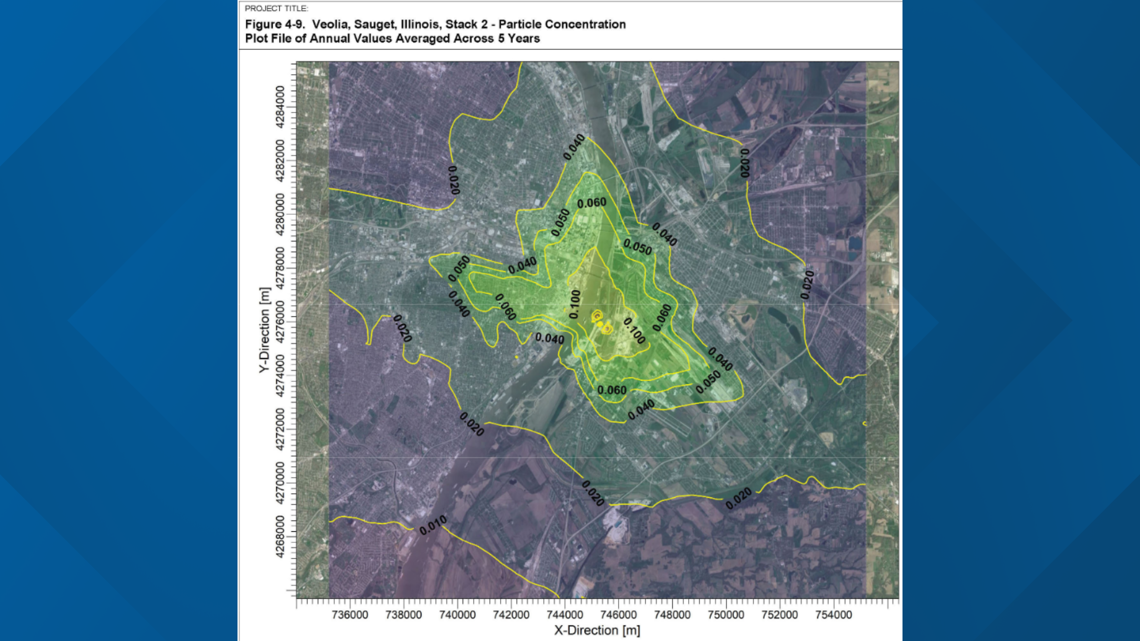
A map shows the particulate matter distribution from the Veolia Incinerator in Sauget. Photo courtesy EPA.
Contact: Nicole Saulsberry, nicole.saulsberry@sierraclub.org
SPRINGFIELD, IL — Today, two major environmental bills that protect Illinoisans from exposure to toxic “forever chemicals” called per- and polyfluoroalkyl substances (PFAS) passed out of the Illinois General Assembly and head now to Gov. J.B. Pritzker’s desk. SB561 phases out the use of PFAS-containing firefighting foam which can contaminate groundwater across the state. HB3190 prevents the incineration of PFAS, which specifically impacts a facility permitted to do so in Sauget, Ill. across the Mississippi River from St. Louis, Mo.
These manufactured chemicals — sometimes called “forever chemicals” — do not break down in the environment or the human body. PFAS are found in products ranging from non-stick cookware to packaging and flame retardants and as a result, are found in the bloodstream of almost every American. PFAS pose a significant threat to public health, and may lead to a number of health issues including liver damage, thyroid disease and cancer.
“These bills will protect Illinoisans across our state from cancer-causing PFAS,” said Nicole Saulsberry, Sierra Club Illinois State Government Representative. “There’s still much more PFAS in food packaging, water repellent clothes, and cleaning products, but tackling firefighting foam will eliminate a huge source of PFAS contamination in our waters.”
PFAS have been found in water bodies, groundwater and drinking water in 49 states. Some states — including Michigan, Colorado, Washington, Maine and New York — have developed regulations and response plans to restrict or ban PFAS-containing firefighting foam.
“Other states are not waiting to act, and now Illinois is taking an important step toward protecting our communities from the harmful effects of PFAS-contaminated drinking water and wildlife from the growing threat of contaminated waterways,” said Iyana Simba, clean water policy director at the Illinois Environmental Council.
Chemicals like PFAS are incredibly durable and flame-retardant, making them useful for products like firefighting foam, but also harmful for the environment and our bodies because of their inability to break down.
Illinois has nine sites of PFAS contamination, including Freeport, Galesburg, Belvidere, Peoria, Bloomington, Springfield, Rantoul, St. Clair County and Rock Island.
“Illinois has a significant opportunity to help thousands of its residents avoid further contamination of this toxic chemical,” said Senator Ellman, chief consponsor of SB561, the PFAS Firefighting Foam reduction bill.
While communities across the country are threatened by increased exposures to PFAS and other hazardous chemicals from incinerations, the areas closest to hazardous waste incinerators face some of the greatest risks. In the United States, waste incinerators are disproportionately located in lower income and communities of color.
“By preventing incinerators, such as the Veolia Incinerator in Sauget, Ill., from burning PFAS, we’re helping to keep toxic compounds out of the lungs of residents in the Metro East,” said Rep. LaToya Greenwood, chief sponsor of the PFAS incineration ban bill. “New York has already banned the incineration of PFAS and I’m glad to see that Illinois is keeping up.”
Some facilities have turned to incinerating PFAS as a means of disposing of the difficult to eliminate chemicals. However, existing incinerators designed to treat other common hazardous wastes have not been shown to eliminate PFAS. Instead, incomplete incineration could potentially emit PFAS, potent greenhouse gases or acutely toxic gases into the atmosphere which fall out into nearby communities.
“Our communities in the Metro East deserve clean water to drink and air to breathe, free from carcinogens and dangerous chemicals,” said Marie Franklin of the United Congregations of Metro East. “We will be able to sleep better at night knowing that the toxic PFAS will not be burned into our air going forward.”